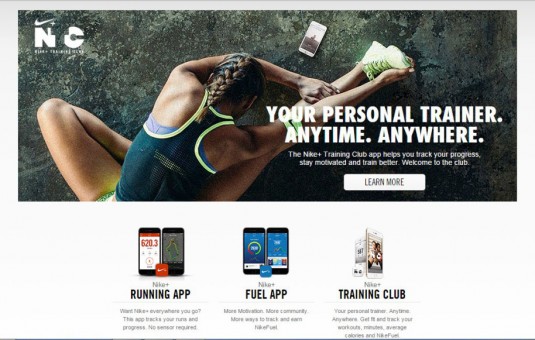Fitness Plans, Social Media and Marketing, Oh My!
 We’re now more than four months into the New Year, and there’s a good chance those ambitious fitness plans you had in mind, along with your social media and mobile marketing plans, have slipped through the cracks. You were on a roll for a while, but maybe something came up: you no longer had time, or your job became overwhelming and stressful. Perhaps you never even got started. Maybe you’re lacking motivation, or maybe you’re just not knowledgable of where and how to start (or restart). Regardless, it sounds like you could use some help rebooting or kick starting your fitness plan. It’s almost summer, which means it’s time to get both you and your social media strategy into shape! Here’s a look at some sites and apps that will challenge you in both areas.
We’re now more than four months into the New Year, and there’s a good chance those ambitious fitness plans you had in mind, along with your social media and mobile marketing plans, have slipped through the cracks. You were on a roll for a while, but maybe something came up: you no longer had time, or your job became overwhelming and stressful. Perhaps you never even got started. Maybe you’re lacking motivation, or maybe you’re just not knowledgable of where and how to start (or restart). Regardless, it sounds like you could use some help rebooting or kick starting your fitness plan. It’s almost summer, which means it’s time to get both you and your social media strategy into shape! Here’s a look at some sites and apps that will challenge you in both areas.
 Social Media/Apps
Social Media/Apps
Social media is a great place to start improving your fitness and diet plans. The number one reason being the majority of our society is already using social media—regardless of what they are using it for. By downloading specific apps, you can begin using social media in a positive way to benefit your health. There are several different apps and social media websites that have been very successful in creating a motivating and informative environment for the public.
Mashable discusses 8 specific Social Networks for Fitness Freaks. They provide a list of well-known, developed social networks that are successful in their efforts to help improve the health of others. I would like to touch on four specific apps from this list to show the various assets available.
- Fitocracy—this app will tap into your competitive nature by tracking your progress with a point-based system, complete with motivating rewards and additional challenges, should you accept them.
- Daily mile—a Twitter-esque site that makes it super easy to share your progress on your personal social media profiles.
- Traineo—a weight loss network that keeps track of your calories and goals, and connects you to people (of your choice) that will motivate you to complete your goals and press forward.
- Spark People—a nutrition site that promotes articles and videos of recipes and tips for eating healthy. They also have “Spark Coaches,” nutrition experts with whom you can connect on the website.
Why Are They Successful?
As you can see, there are a large number of social media websites and apps that are trying to improve fitness and diet plans—but what makes them successful? How can we set them apart from the ones that aren’t getting it? It’s the difference between a “popular” or “trending” site as opposed to a social network that no one uses. The site must be well-known, but more importantly, it needs to get the users to take action.
How Do We Measure Success?
You might think we measure the success of a social media site based on the number of likes, followers, favorites or comments. Not quite. Everything that happens after the posts/tweets/participation is what truly matters.
In more complicated terms, success of a social media site is measured by four distinct metrics, regardless of the social channel you use. According to Avinash Kaushik, these four metrics are:
Conversation rate= # of replies/comments
Amplification rate= # of shares/retweets
Applause rate= # of favorites/likes
Economic value= Sum of Short and Long Term Revenue and Cost Savings
The first three metrics all lead up to the fourth metric, economic value, which is ultimately the most important. Showing direct economic value will help you refrain from ever having to plead for investment in social media. The numbers will speak for themselves.
Success could mean someone will . . .
- Buy something
- Sign up for your marketing list
- Order a catalog
- Write reviews for products
- Sign up as an affiliate
- Create wish lists or registries
- Phone your call center
All of these outcomes are referred to and measured as micro (long term value) and macro (immediate value) conversions. The sum of these two conversions ultimately measures economic value!
Just Do It
The Nike+ social media website is an example of a company successfully implementing social media to help users kick start their fitness plans. Nike+ branched out and created several different apps—each app meeting the needs of a specific audience. For example, there is now Nike+ training club, Nike+ running, Nike+ fuel and Nike+ move. These were designed to take different approaches for helping users improve their fitness by tracking progress, staying motivated and training hard. After downloading and exploring Nike+ running, I was able to see how Nike successfully implemented an app to improve their company as well as the fitness of their users.
http://www.youtube.com/watch?v=P7-5HDG7yMc
Nike+ is a well-developed social media/app campaign providing a motivating and positive environment for users to get started on (or continue) improving their fitness and overall health. Nike is just one of many companies that have discovered how to positively use social media to help improve the health of others as well as the success of their company. After looking at these successful programs, I hope you’ll go forward into your summer with more motivation not only for your personal fitness, but also for your marketing strategies.
Rachel Ferrara—Content Creator

 Social Media/Apps
Social Media/Apps


